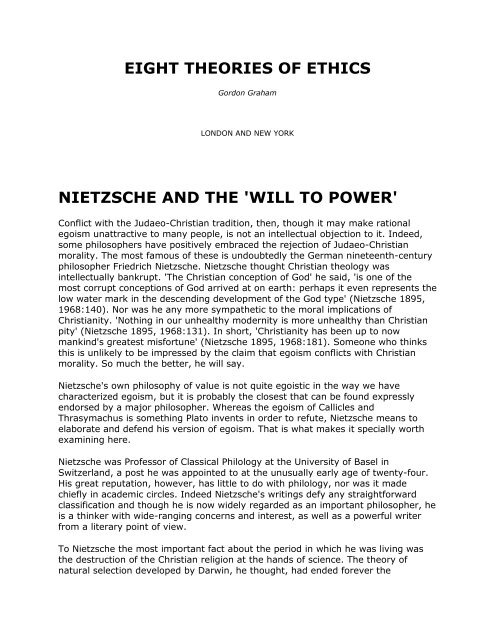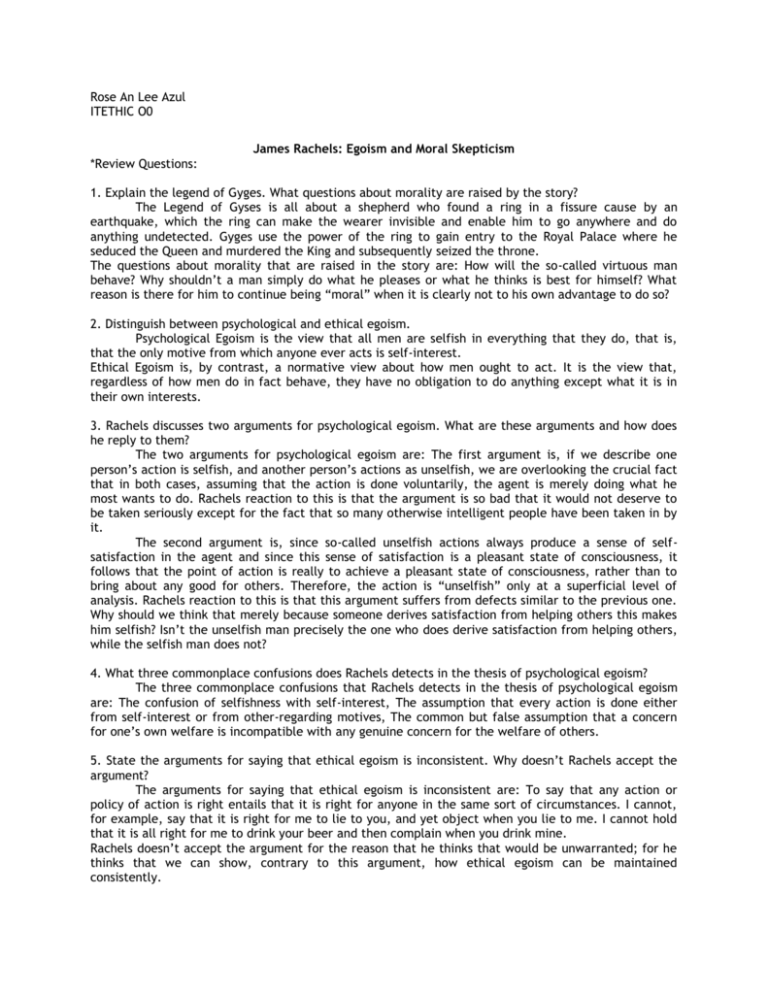What Ethical Theory Best Describes Nietzsche's Ethical Thought
After introducing the idea at the end of The Gay Science he made it one of the fundamental concepts of his next work Thus Spoke Zarathustra. Zarathustra the prophet-like figure who proclaims Nietzsches teachings in this.

Eight Theories Of Ethics Nietzsche And The Will To Power Jessbcuzz
The purpose of this article is to explain different ethical theories and compare and contrast them in a way thats clear and easy for students to understand.

. Virtue ethics is characterized by the centrality of character in normative ethical theory where norms of excellence of character provide norms for both the good life in general and acting well and rightly. The new morality which must accompany the Superman in his conquests is the WILL TO POWER. However we can expect further developments in virtue ethics which are inspired by other sources such as Nietzsche and Hume.
Plato held that the ultimate source of reality and goodness is obtained knowledge and reason which lies beyond the physical natural worldp261T A. Because Nietzsche often describes himself as an immoralist it might seem as though Nietzschean Ethics is an oxymoron. There are three major categories of ethical systems that students typically learn about in philosophy classes.
Valuable in the highest degree. A pre-judgement hold to be true but not thought about or deliberated on good according to the master morality. According to Nietzsche there is no inherent meaning in life to be discovered.
As mentioned previously Rae suggests that ethics are a process that is both an art and a science. The death of God is in fact ambivalent. How can Nietzsche possibly reject morality and advance an ethical theory at the same time.
Nietzsches master and slave morality is a descriptive account. Aristotles virtue ethics is normative. They are attempts in other words to tell a single story about what we are obligated to do without referring directly to specific examples.
There are four major ethical theories. The Ethics of Nietzsche. Consequentialism deontology and virtue ethics.
Deontology or duty utilitarianism rights and virtue. A Emphasizes concepts such as individual existence freedom and choice. Aristotle thought that the key to happiness.
Why is the best friendship a complete one. I will describe all of them briefly. Friedrich Nietzsche expresses an ethical theory in which he believes all humans should simply strive for power regardless of how it affects others.
Socrates believed that non-virtuous conduct of ignoble behavior is usually the result of willing evil. It is the job of human beings to create meaning in their lives valuesrationales for existence in order to survive and hopefully flourish. In short Nietzsche thought there was an entire field of moral possibilities and values.
Achievement ambition the striving to reach the highest possible position in life. What Nietzsche describes is aristocratic self-assertion. C the main force that drives humans in life.
This chapter explores Nietzsches critique of morality and his naturalistic account of the origins and development of morality. Ethics is the branch of philosophy that deals with morality and how it shapes behavior. Nietzsche reported that this thought came to him suddenly one day in August 1881 while he was taking a walk along a lake in Switzerland.
Nietzsche views guilt as a creditor-debtor relationship derived from the sphere of legal obligations. Nietzsches other response to his question involves opposing metaphysical thinking to what he terms historical philosophy. He claims that morality is a hopeless project because it ultimately fails to.
Learn vocabulary terms and more with flashcards games and other study tools. According to Nietzsches view one ought to conceive of human knowledge in terms of a process of development whereby self-consciousness arises from the material conditions of life. It is common in discussions of business ethics to appeal to one or.
Despite his wide influence on philosophical thought Friedrich Nietzsche is best known for denying the value of morality. Ethical Theories are attempts to provide a clear unified account of what our ethical obligations are. Nietzsche finds however that the actions to which these qualities prompt are frequently of a kind to pro- duce bad effects.
D the concept that there are two kinds of people. Click again to see term. Nietzsches approach to ethics was greatly influenced by.
Some as Nietzsche calls the last men believe that the absence of God leads to nihilism and immorality purely and simply. Nietzsche said this culture is characterized by mediocrity and it is dying out. They lead to the preservation of many per- sons who when the good of future generations is taken into account had on the whole better be allowed to perish.
B the rejection of all religious and moral principles often in the belief that life is meaningless. - Nietzsche believed this would clear ones debts because to MAKE suffer was in the highest degree pleasurable. Claiming to be an immoralist Nietzsche not only denies that morality has a right to our adherence but also insists that morality is something bad that ought to be overcome.
This differs from the kind of assertion of the pre-modern period which is required by a certain role. Though this sounds like an ideal theory because we would always have what we need this mindset would lead to an unsuccessful society. 347 a high place.
Nonetheless Nietzsche is often categorized as a virtue ethicist also. The scientific theory of evolution. - In this sense guilt is also associated with suffering because the guilty party can pay off his debt if the creditor makes him suffer.
Start studying Ethics - Aristotle Nietzsche. Instead Thomas Hobbes presents a more preferable idea for society by establishing a. Tap again to see term.
Nietzsche on Free Will Causality and Responsibility interprets Nietzsche as a compatibilist about free will and expresses a significant change from her earlier influential account of Nietzsches metaphysics. There are generally three philosophical approaches or what may be considered the science to ethical reasoning. Click card to see definition.
Tap card to see definition. Its debatable whether Nietzsche offers a coherent normative ethical theory. Different branches of the study of ethics look at where our views of morality come from and how they shape our everyday lives.
The new morality must make great things possible restore the mans potential to create. Like Hobbes Nietzsche believed that. The strong people who can live life and.

Intro To Ethical Theory Youtube


No comments for "What Ethical Theory Best Describes Nietzsche's Ethical Thought"
Post a Comment